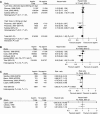Aspirin and cancer: has aspirin been overlooked as an adjuvant therapy?
- PMID: 21847126
- PMCID: PMC3208483
- DOI: 10.1038/bjc.2011.289
Aspirin and cancer: has aspirin been overlooked as an adjuvant therapy?
Abstract
Aspirin inhibits the enzyme cyclooxygenase (Cox), and there is a significant body of epidemiological evidence demonstrating that regular aspirin use is associated with a decreased incidence of developing cancer. Interest focussed on selective Cox-2 inhibitors both as cancer prevention agents and as therapeutic agents in patients with proven malignancy until concerns were raised about their toxicity profile. Aspirin has several additional mechanisms of action that may contribute to its anti-cancer effect. It also influences cellular processes such as apoptosis and angiogenesis that are crucial for the development and growth of malignancies. Evidence suggests that these effects can occur through Cox-independent pathways questioning the rationale of focussing on Cox-2 inhibition alone as an anti-cancer strategy. Randomised studies with aspirin primarily designed to prevent cardiovascular disease have demonstrated a reduction in cancer deaths with long-term follow-up. Concerns about toxicity, particularly serious haemorrhage, have limited the use of aspirin as a cancer prevention agent, but recent epidemiological evidence demonstrating regular aspirin use after a diagnosis of cancer improves outcomes suggests that it may have a role in the adjuvant setting where the risk:benefit ratio will be different.
Figures


Comment in
-
Aspirin therapy for cancer: it is never too late.Br J Cancer. 2011 Oct 11;105(8):1105-6. doi: 10.1038/bjc.2011.373. Br J Cancer. 2011. PMID: 21989214 Free PMC article. No abstract available.
-
Aspirin as adjuvant therapy in childhood cancer?Br J Cancer. 2012 Jan 3;106(1):240. doi: 10.1038/bjc.2011.467. Epub 2011 Nov 10. Br J Cancer. 2012. PMID: 22075944 Free PMC article. No abstract available.
References
-
- Baron JA, Cole BF, Sandler RS, Haile RW, Ahnen D, Bresalier R, McKeown-Eyssen G, Summers RW, Rothstein R, Burke CA, Snover DC, Church TR, Allen JI, Beach M, Beck GJ, Bond JH, Byers T, Greenberg ER, Mandel JS, Marcon N, Mott LA, Pearson L, Saibil F, van Stolk RU (2003) A randomized trial of aspirin to prevent colorectal adenomas. N Engl J Med 348: 891–899 - PubMed
-
- Benamouzig R, Deyra J, Martin A, Girard B, Jullian E, Piednoir B, Couturier D, Coste T, Little J, Chaussade S (2003) Daily soluble aspirin and prevention of colorectal adenoma recurrence: one-year results of the APACC trial. Gastroenterology 125: 328–336 - PubMed
-
- Borthwick GM, Johnson AS, Partington M, Burn J, Wilson R, Arthur HM (2006) Therapeutic levels of aspirin and salicylate directly inhibit a model of angiogenesis through a Cox-independent mechanism. FASEB J 20: 2009–2016 - PubMed
-
- Bosetti C, Gallus S, La Vecchia C (2006) Aspirin and cancer risk: an updated quantitative review to 2005. Cancer Causes Control 17: 871–888 - PubMed
-
- Bresalier RS, Sandler RS, Quan H, Bolognese JA, Oxenius B, Horgan K, Lines C, Riddell R, Morton D, Lanas A, Konstam MA, Baron JA (2005) Cardiovascular events associated with rofecoxib in a colorectal adenoma chemoprevention trial. N Engl J Med 352: 1092–1102 - PubMed
Publication types
MeSH terms
Substances
Grants and funding
LinkOut - more resources
Full Text Sources
Other Literature Sources
Research Materials

